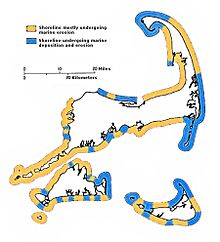
Back ترسب Arabic Akkumulyasiya (geologiya) Azerbaijani Deposició (geologia) Catalan Gwaddodiad Welsh Απόθεση Greek Deposición (geología) Spanish Settimine Estonian Jalkitze Basque نهشتهگذاری Persian Dépôt (géologie) French

Deposition is the geological process in which sediments, soil and rocks are added to a landform or landmass. Wind, ice, water, and gravity transport previously weathered surface material, which, at the loss of enough kinetic energy in the fluid, is deposited, building up layers of sediment.
This occurs when the forces responsible for sediment transportation are no longer sufficient to overcome the forces of gravity and friction, creating a resistance to motion; this is known as the null-point hypothesis. Deposition can also refer to the buildup of sediment from organically derived matter or chemical processes. For example, chalk is made up partly of the microscopic calcium carbonate skeletons of marine plankton, the deposition of which induced chemical processes (diagenesis) to deposit further calcium carbonate. Similarly, the formation of coal begins with the deposition of organic material, mainly from plants, in anaerobic conditions.
- ^ Oldale, Robert N. (1999). "Coastal Erosion on Cape Cod: Some Questions and Answers". Cape Naturalist, the Journal of the Cape Cod Museum of Natural History. 25: 70–76. Archived from the original on 2016-03-15. Retrieved 15 October 2016.